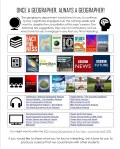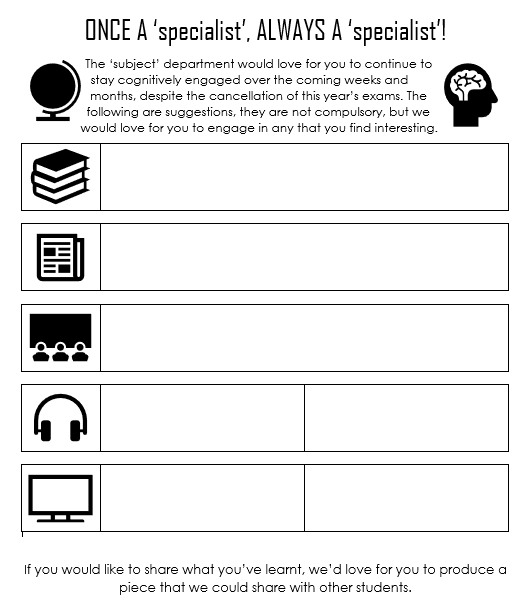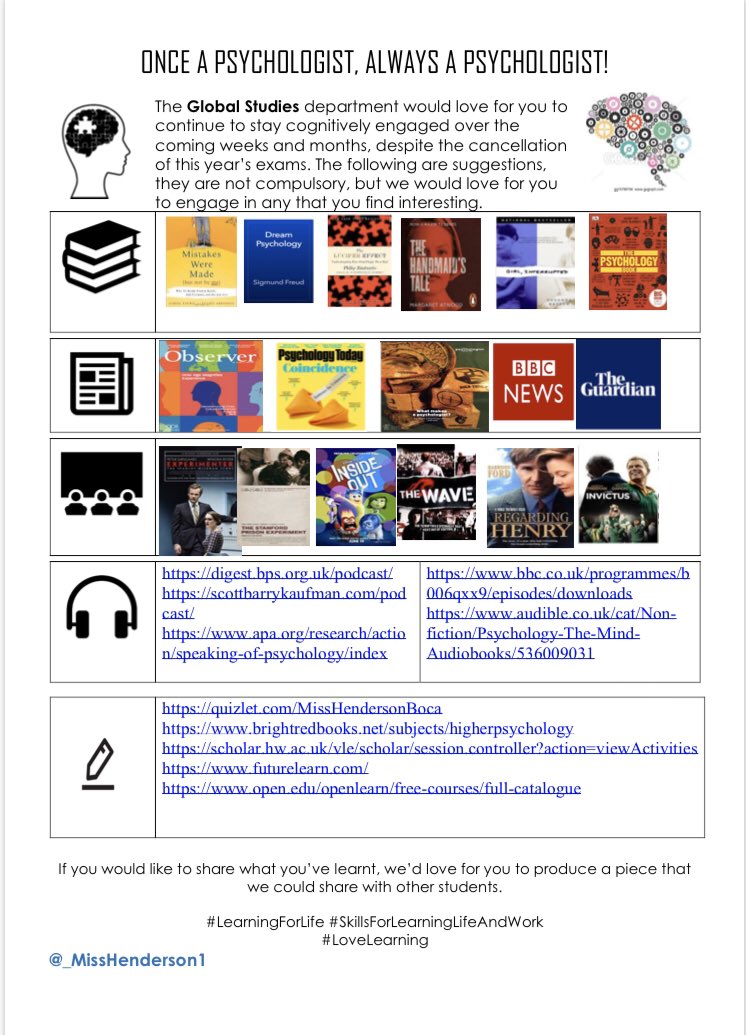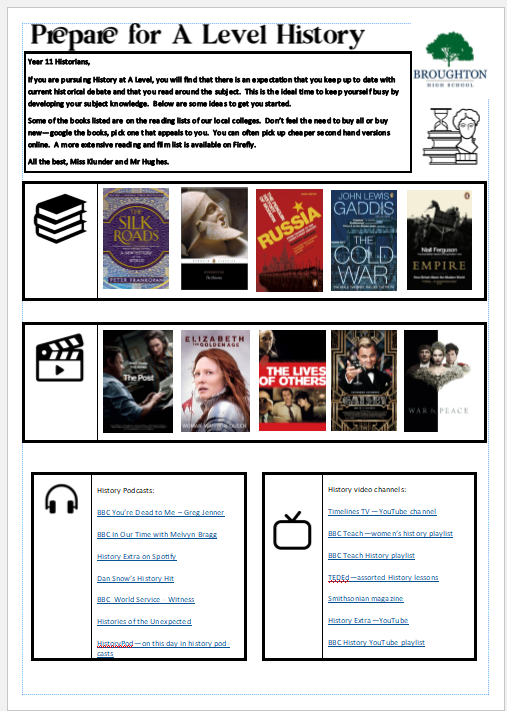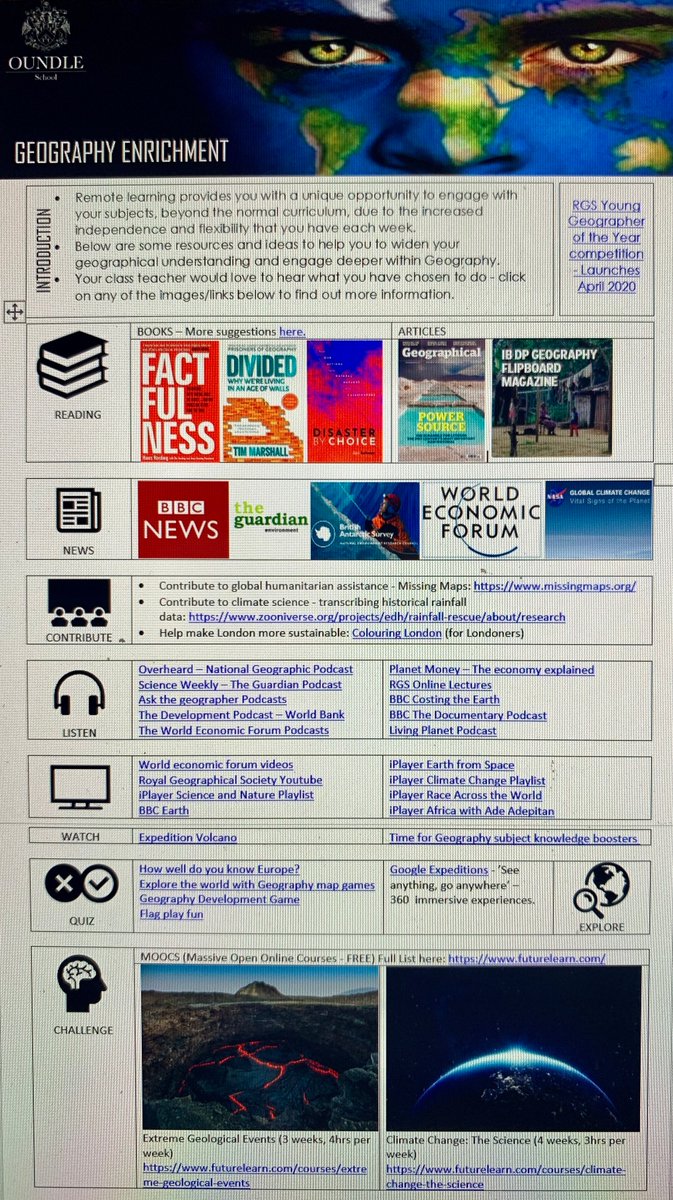
Are we doing too much for our learners? This question has plagued me a lot recently.
I’ve seen hundreds of fabulous resources that take the hard work out of learning for our students. That remove the responsibility from students to teacher. That take the independence from the learning process. That make them dependent on us, their teachers.
Now I’m sure many people will argue with me that it’s a result of increased scrutiny; the unrealistic performance management targets; the use of target grades etc. Which are all completely valid arguments and I agree, but it still scares me that so many teachers are doing so much for their students. Things that take away their students responsibility and independence in the learning process.
Things like case study guides with all of the content students need, completed knowledge organisers, again with all of the content students need. Completed exam questions, so students can learn to replicate. Revision booklets again with all of the content. It all worries me.
I’ve never hidden the fact that I facilitate learning, that my aim as a teacher is to make my students as independent as possible in my classroom and in their learning. That I want my students to leave school being able to learn for themselves; to be able to critically analyse and evaluate; to design and create; to research effectively; to be responsible for their own learning; to want to continue learning after compulsory education.
I’ve created numerous posts on developing independent learners such as these
Developing Independent Learners – Help Yourself Display and Resource Station
Developing Independent Learners – Seating Plans
Developing Independent Learners – Attempts at Flipped Learning
Developing Independent Learners
Developing Independent Learners – Independent Learning Projects
Developing Independence in the Humanities Classroom
Although my practices have evolved and changed over the last 4-5 years, developing independent learners is still at the core of my teaching.
Some ways I approach ‘developing independence’ are as follows
1 // ‘Help Yourself’ stations
I’m a big believer that students should learn to take responsibility for their progress and learning. That we should facilitate them in any way we can to help and support them but at the end of the day, we don’t sit their exams. That’s down to them.
Here’s some further reading from Tom Rogers if you’re interested
Anyway, whilst I do differentiate for students individual needs I also believe that students need to be able to identify when they need support and should develop the ability to be able to work out for themselves what that support looks like.
Therefore in my classrooms for the last 4 years, there have been a ‘help yourself’ areas or stations. This is an area where students can find resources that can support them in a variety of ways. For instance students can find sentence starter mats to help get them started with a variety of extended writing tasks, topic platemats/knowledge organisers that provide the key content of topics (see below for more details), blank maps, atlases, peer and self assessment sheets, note taking templates, timeline sheets and the list goes on. All of which students can help themselves to in order to help them with the tasks they are undertaking.
Initially I will direct students to particular support and overtime encourage them to help themselves to the resource they feel appropriate. Usually as students start to recognise their areas of ‘weakness’ they can independently select the appropriate support strategy.
Read more on ‘Help Yourself’ stations in my original post here.
2 // Project Breakdown
I start year 7 with a homework project that is broken up into smaller chunks, each with their own deadline. We cover map and atlas skills to ensure all students embark on the rest of their geographical learning with the basic skills required.
Student’s therefore complete a project as homework over the course of the first term on a European country of their choice. Each chunk of the project fits with the work covered in class allowing the students to demonstrate the skills and knowledge they developed in the lesson.
The breaking down of the project into chunks develops students time management skills and teaches them to break down a project over time to ensure they do not complete other projects just before the deadline.
Over time these breakdowns are removed so students can independently carry out projects without the haste of
3 // Blank or Basic Knowledge Organisers (AKA Placemats, Knowledge Mats etc.)
I’ve seen knowledge organisers with the entire topic on one sheet. All the content a student needs to know. It makes me question why the student needs to listen, to participate in the lesson, to do the tasks set by their teacher. If they have everything they need to know in front of them, surely it encourages students to ‘switch off’. Some may argue that students have KOs in order to then apply the knowledge, but I fear this reduces their ability to retrieve information.
I prefer to use KOs or placemats as they were originally intruduced to me to provide a basic outline of the content students generally struggle with.
For Geography for instance I often find students confuse the 3 tectonic plate boundaries and find it hard to visualise convection currents.

In History it tended to be the sequence of events, names and places.

Therefore I created a basic visual summary for my students to collect if they so desired. These mats would consist again of the very basics to support my learners.
I also encourage students to create their own KOs at KS5 and hope to implement this into KS4 in due course. In order for my KS5 students to do this I’ve created KO sheets with blank boxes, except for a question or statement in which they respond to in order to collate the knowledge they need to demonstrate thus retrieving and revising the content for use later on.


4 // Revision
I refuse to give students the content they need to know in the form of a booklet or similar in order to revise from. Sorry, but they should get that from lessons, why else bother going to lessons if it’s not to learn the content?!
Instead for I provide a variety of resources to support my students.
To start with for each topic students receive an AfL grids with an outline of the topic content. At the start of the topic students self-assess their prior knowledge and then at the end their understanding of the topic in order to highlight the areas for future revision.
Then in regards to revision of the content I’ve created how to revise guides to help students to develop an ongoing approach to revision as well as teaching retrieval strategies and exam technique in class.
In addition I’ve created case study templates for students to complete to summarise the case studies and examples explored. To support revision these have been combined into a case study and exam question booklet so students can also apply the content to exam style questions.

All these strategies require my students to do the work and be responsible for their own learning and progress. I’ve provided the resources, taught the content and given them the support they need to succeed but it’s up to them to actually learn what they need to know for the exam.
5 // Inquiry/Enquiry based learning
At my school we have a real ethos for developing inquirers. I love that we do loads of inquiry based learning across the school. Students get to question, research and develop their curiosity throughout.
In KS3, at the start of each unit, my students write down questions. These questions influence my planning, the resources I use and the lesson objectives over the course of the topic. Students are the driving force of the lesson content. I teach the same year group the same topic to reach the same outcomes but the approach varies dependent on the class questions.
Now that I’m settled in my ‘new’ school for a full year, I’ve seen the progression students make through this approach. Enquiry truly develops their curiosity and interest; they constantly challenge me to further my subject knowledge and keep it up to date as their questions get us exploring aspects I’ve missed in the past or thought not relevant when planning schemes of work.
Through their questioning comes exploration, analysis and evaluation; deepening their understanding and I love it.
How do you develop independence in your learners? Feel free to leave a comment or get in touch.



